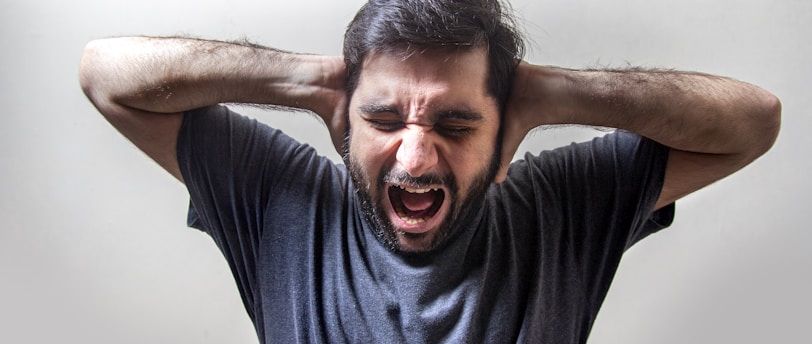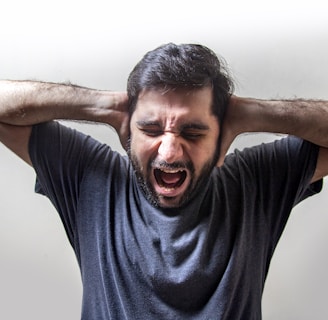Understanding the Body, Mental, and Behavioral Symptoms of Anxiety and Panic Attack
MENTAL HEALTH TOOLSANXIETY


Anxiety Disorder is a common mental health condition that affects millions of people worldwide. It can manifest in various ways, impacting both the mind and body. Recognizing the symptoms of anxiety is crucial for early intervention and seeking appropriate treatment. In this article, we will explore the body, mental, and behavioral symptoms associated with anxiety.
Body Symptoms of Anxiety Disorder
Anxiety can have a profound impact on the body, leading to a range of physical symptoms. These symptoms may vary from person to person, but some common ones include:
Increased Heart Rate: Anxiety often triggers a rapid heartbeat, known as palpitations. This can be accompanied by chest tightness or discomfort.
Shortness of Breath: Many individuals with anxiety experience difficulty breathing or a feeling of being unable to catch their breath.
Sweating: Profuse sweating, even in cool environments, is a common physical symptom of anxiety.
Trembling or Shaking: Anxiety can cause involuntary shaking or trembling of the hands, legs, or other body parts.
Stomach Upset: Nausea, stomach pain, and digestive issues can be associated with anxiety.
Headaches: Tension headaches or migraines are often triggered by anxiety or stress.
Muscle Tension: Anxiety can lead to muscle tension, resulting in aches, pains, or stiffness.
Insomnia: Difficulty falling asleep or staying asleep is a common symptom of anxiety.
Mental Symptoms of Anxiety
Anxiety not only affects the body but also has a significant impact on mental well-being. The following are some of the mental symptoms commonly associated with anxiety:
Excessive Worry of Fear: Anxiety often manifests as persistent and excessive worry about various aspects of life, such as work, relationships, or health.
Racing Thoughts: Individuals with anxiety may experience a constant stream of racing thoughts, making it challenging to concentrate or relax.
Irritability: Anxiety can lead to irritability, making individuals more prone to frustration or anger.
Feeling On Edge: Many people with anxiety describe a constant sense of unease or feeling on edge.
Difficulty Focusing: Anxiety can impair concentration and make it difficult to focus on tasks or make decisions.
Memory Problems: Some individuals with anxiety may experience memory difficulties, such as forgetfulness or difficulty recalling information.
Overthinking: Anxiety often leads to overthinking or dwelling on negative thoughts or past events.
Feeling Overwhelmed: Anxiety can create a sense of being overwhelmed by even small tasks or responsibilities.
Mind going blank: Difficulty thinking clearly or a sense of mental fog.
Difficulty making decisions: Struggling to make choices, even about simple matters.
Intrusive thoughts: Unwanted and distressing thoughts that repeatedly enter the mind
Catastrophizing (expecting the worst): Always anticipating the worst possible outcomes in various situations.
Cognitive Distortions: Engaging in distorted thinking patterns, such as catastrophizing (expecting the worst), black-and-white thinking, or overgeneralization.
Perfectionism: Setting unrealistically high standards for oneself and feeling a constant need to meet those standards.
Self-Doubt: Constantly questioning one's abilities, decisions, or self-worth.
Cognitive Fatigue: Feeling mentally exhausted due to the constant processing of anxious thoughts.
Excessive Guilt or Self-Blame: Feeling disproportionately guilty or blaming oneself for things beyond one's control.
Mood Swings: Rapid and intense changes in mood, from elation to irritability or sadness
Irrational phobias: Developing intense fears or phobias that may not be logically connected to specific situations.
Behavioral Symptoms of Anxiety
Anxiety can also impact a person's behavior, leading to changes in their actions or habits. Some common behavioral symptoms associated with anxiety include:
Avoidance: Individuals with anxiety may avoid certain situations or places that trigger their anxiety, leading to social isolation or withdrawal.
Restlessness: Anxiety can cause restlessness or an inability to sit still, leading to pacing, fidgeting, or constant movement.
Sleep Disturbances: Anxiety often disrupts sleep patterns, leading to difficulties falling asleep, staying asleep, or experiencing restless sleep.
Changes in Appetite: Some individuals may experience changes in appetite, leading to overeating or loss of appetite.
Compulsive Behaviors: Anxiety can manifest as repetitive behaviors or rituals, such as excessive handwashing, checking locks, or counting.
Procrastination: Anxiety can lead to procrastination or avoidance of tasks due to fear of failure or excessive worry.
Substance Abuse: Some individuals may turn to alcohol, drugs, or other substances as a means of coping with their anxiety.
Impaired Social Functioning: Anxiety can interfere with social interactions, causing individuals to withdraw from social situations or experience difficulties in forming and maintaining relationships.
Nail biting or other nervous habits: Engaging in repetitive behaviors as a way to cope with anxiety.
Seeking reassurance: Constantly seeking confirmation or validation from others to alleviate anxiety.
Restlessness or pacing: Inability to stay still, accompanied by fidgeting or pacing.
Changes in sleep patterns: Disruptions in normal sleep routines, either difficulty falling asleep or excessive sleeping.
Difficulty relaxing: Trouble unwinding or finding peace of mind.
It is important to note that experiencing occasional anxiety is a normal part of life. However, if these symptoms persist, worsen over time, or significantly interfere with daily functioning, it may be indicative of an anxiety disorder. If you or someone you know is struggling with anxiety, it is advisable to seek professional help from a mental health provider.
Remember, anxiety is a treatable condition, and with the right support and treatment, individuals can learn to manage their symptoms and improve their overall well-being.


Panic attacks are intense and sudden episodes of overwhelming fear or discomfort that reach a peak within minutes. They can be accompanied by a variety of physical, emotional, and cognitive symptoms.
Here are common symptoms associated with panic attacks:
Body Symptoms of Panic Attacks
Heart palpitations or accelerated heart rate: Feeling a rapid or pounding heartbeat.
Sweating: Profuse sweating, often accompanied by cold or clammy skin.
Trembling or shaking: Involuntary movements, especially in the hands or limbs.
Shortness of breath or a feeling of choking: Difficulty breathing or a sensation of being unable to catch one's breath.
Chest pain or discomfort: A sharp or dull pain in the chest, which may be mistaken for a heart attack.
Nausea or abdominal distress: Upset stomach or a feeling of discomfort in the abdomen.
Dizziness or lightheadedness: Feeling unsteady or faint.
Chills or heat sensations: Experiencing sudden sensations of cold or heat.
Mental Symptoms of Panic Attacks
Derealization: Feeling detached from reality or experiencing a sense that the surroundings are unreal.
Depersonalization: Feeling detached from oneself, as if observing one's own actions from a distance.
Intense apprehension or terror: A heightened sense of fear or impending doom.
Difficulty concentrating or thinking clearly: Inability to focus on thoughts or tasks.
Behavioral Symptoms of Anxiety
Hyperventilation: Rapid and shallow breathing, often contributing to other physical symptoms.
Hot flashes or chills: Sudden sensations of warmth or cold.
It's important to note that panic attacks can occur unexpectedly or be triggered by specific situations. Individuals who experience recurrent panic attacks may be diagnosed with panic disorder. If someone is experiencing panic attacks, it's advisable to seek the guidance of a mental health professional for a thorough evaluation and appropriate treatment options. Treatment may include psychotherapy, medication, or a combination of both.
